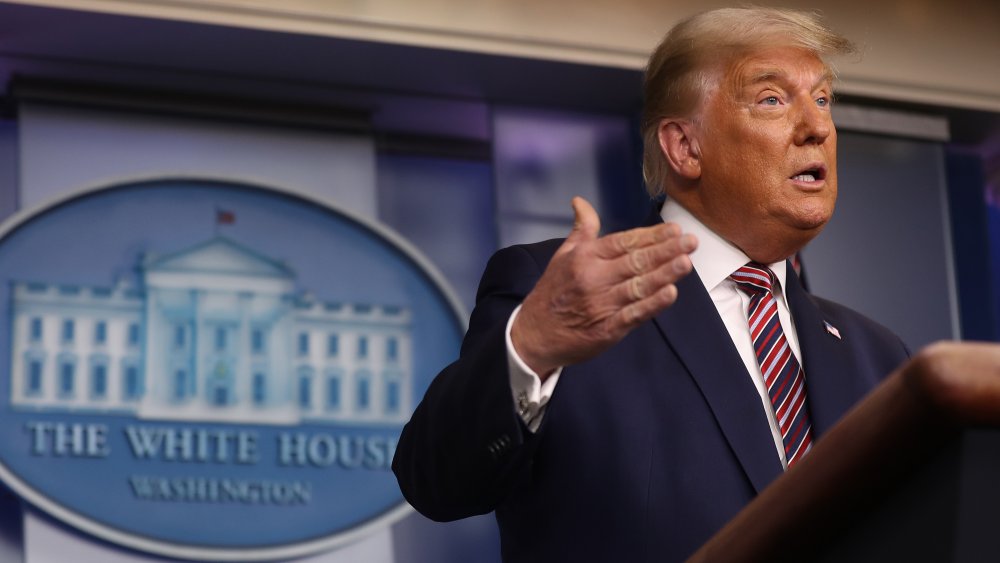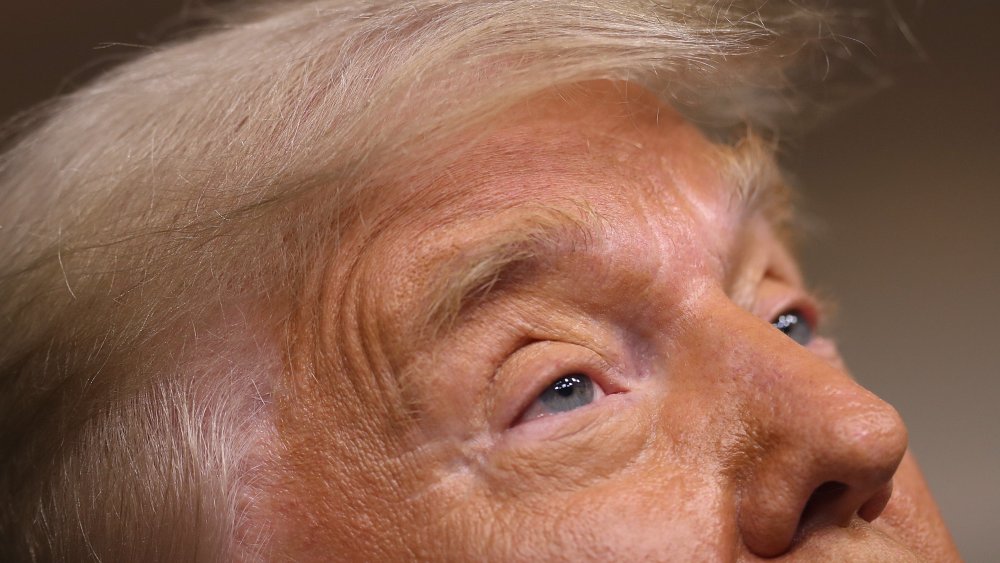What Happens If A Sitting President Refuses To Concede An Election
As the neck-and-neck 2020 presidential election dragged on for days — the protracted result of an unprecedented number of mail-in ballots due to voters' concerns about the coronavirus pandemic — incumbent president Donald Trump unsurprisingly cried foul play. As Intelligencer reported on November 4, the president made a late-night speech from the White House prematurely declaring victory. Then as votes continued to be counted, and he saw his lead slipping away in key states, he paradoxically called for some to stop counting and others to continue, depending on his standing at the time. According to Business Insider, Trump was advised by his aides that the characteristically impulsive cry to "stop the count!" would have actually given the election to challenger Joe Biden, had election officials across the country heeded his call.
In the months leading up to election day, Trump repeatedly circulated the unverified claims that mail-in voting would be rife with fraud. According to the BBC, he has tweeted over 70 times about what he considered to be the unreliability of mail-in voting, voter fraud, or otherwise "rigged" elections since April. But as that organization and many others, like The New York Times, have repeatedly pointed out, studies consistently show that all forms of voter fraud are extremely rare.
Is a sitting president required to concede defeat?
According to Joel Shannon at USA Today, no president in modern history has refused to concede defeat once the numbers have come in, but there is no law requiring a concession. It's actually up to the losing candidate to be a good sport and admit defeat. "Without a concession, usually hidden parts of the election process — such as the inner workings of the Electoral College — could be ripped open and used to decide the election in an unprecedented way," wrote Shannon. "It would mean a race could be headed for a result decided by the courts or by obscure parts of the law."
But in this choose-your-own-reality era of "alternative facts" and QAnon – the utterly outrageous conspiracy theory that Trump is saving the world from fetus-eating pedophiles — the president has already stoked fears that he won't leave office if he loses. The Guardian reported that he refused to commit to a peaceful transfer of power when asked about the possibility at a "surreal" press briefing in September. "We're going to have to see what happens, you know that," replied the president. "I've been complaining very strongly about the ballots, and the ballots are a disaster."
What if an incumbent president refuses to leave the White House?
According to Live Science, no sitting president has ever rejected the results of an election. Contests in 1824 and 1876 went to the House of Representatives after neither candidate came away with a majority in the electoral college, but no one has ever actually refused to leave the White House. For centuries, it's been little more than faith in U.S. institutions that has ensured the peaceful transfer of power. History professor Jonathan Gienapp told Stanford News in October that the Constitution does not require a losing incumbent president to vacate the office. "We have institutions that can be called upon to arbitrate disputes or deny unlawful usurpations of power, but the safeguards that will decide matters are more political than constitutional," he said. "It may fall to elected political leaders, as it did in 1876-77, to work out some sort of compromise. Or, if necessary, the people will need to exercise their fundamental right to assemble and protest in an attempt to bring about resolution."
For its part, the Biden campaign said it was not worried about Trump refusing to step down if he lost the race. The New York Times reported on November 6 that the campaign reiterated its statement from July that the American people would ultimately decide the election. "And the United States government is perfectly capable of escorting trespassers out of the White House," it added.
Trump's cries of voting fraud split Republican support for him down the middle
As seen in a video published by Business Insider, Trump's continued peddling of false claims of rigged elections inspired his supporters in Arizona and Michigan to gather in Phoenix and Detroit to chant opposing slogans, the former demanding the count continue and the latter shouting for it to stop.
But Mr. Trump's attempts to manipulate the election to his advantage could end up backfiring on him. The New York Times reported that those in his own party reacted in very different ways, with some supporting the baseless claims, and others reprimanding him for questioning the country's time-tested institutions. While people like Trump's children and Kentucky Senator Mitch McConnell showed either tacit or unbridled support for the president's claims, others, like Republican Senators Mitt Romney and Pat Toomey, directly censured him. Romney said that Trump has the right to request recounts of tight races and present valid proof of fraud if he has it, but added that he "is wrong to say that the election was rigged, corrupt and stolen — doing so damages the cause of freedom here and around the world, weakens the institutions that lie at the foundation of the Republic, and recklessly inflames destructive and dangerous passions."



